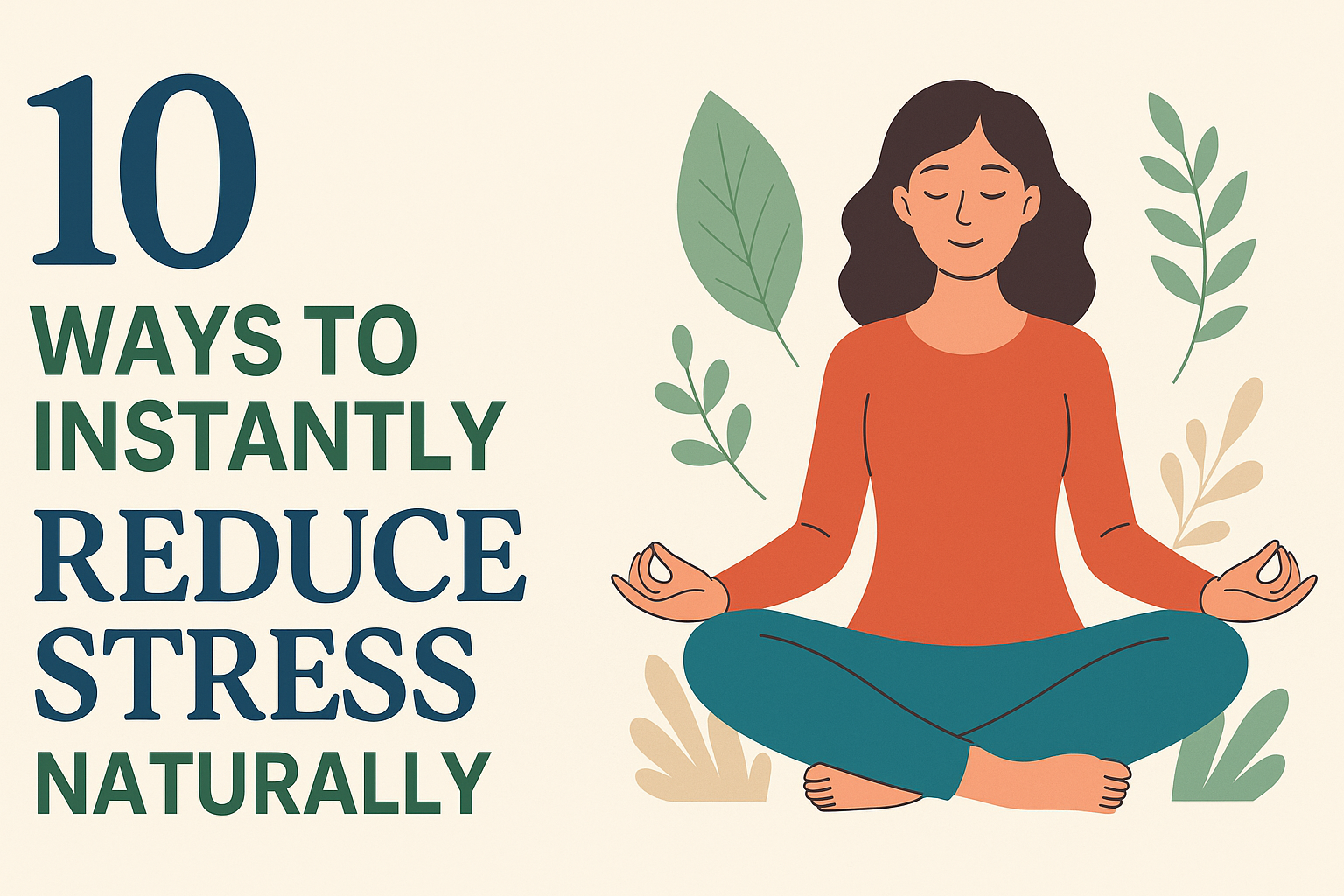Reduce stress naturally with these 10 simple, science backed techniques that calm your mind and body. From deep breathing to herbal teas, discover easy ways to feel relaxed, refreshed, and in control no medication needed.
Table of Contents
🧘 Introduction: Why Quick Natural Stress Relief Matters
In today’s fast paced world, stress can creep into our lives without warning affecting everything from our sleep to our productivity. While occasional stress is normal, chronic stress can take a toll on your mental and physical health. Fortunately, there are simple, natural ways to reduce stress instantly without relying on medications or complicated routines. In this post, you’ll discover 10 effective and science backed techniques that bring calmness and balance back into your life.
Practice Deep Breathing Techniques for Immediate Calm
One of the fastest and most effective natural ways to reduce stress is deep breathing. It might sound too simple to be true, but focused breathing can significantly calm your nervous system in just a few minutes. When we’re stressed, our breathing tends to become shallow and fast, which triggers the body’s “fight or flight” response. Deep breathing helps reverse this by activating the parasympathetic nervous system the part of your body responsible for rest and relaxation.
To get started, try a simple technique called box breathing. Inhale slowly through your nose for 4 seconds, hold your breath for 4 seconds, exhale through your mouth for 4 seconds, and then hold again for 4 seconds. Repeat this for 3–5 minutes. You’ll be surprised how quickly your mind begins to settle.
You don’t need any equipment or a special setting just a quiet space and your breath. Practicing this daily can lower cortisol levels, improve sleep, and even help with anxiety.
Use Herbal Teas Like Chamomile to Lower Stress Naturally
Sipping on a warm cup of herbal tea is more than just a cozy ritual it’s a time tested remedy to naturally reduce stress. Certain herbal teas contain compounds that promote relaxation, calm the nervous system, and even improve sleep quality. One of the most well known is chamomile tea, which has gentle sedative effects and has been used for centuries to ease anxiety and tension.
Chamomile is rich in antioxidants like apigenin, which binds to specific receptors in the brain that help you relax. Studies have shown that drinking chamomile tea regularly can significantly reduce symptoms of stress and even mild depression. The act of slowly sipping a warm beverage also encourages you to pause, breathe, and become present helping to break the cycle of racing thoughts.
Other calming herbal teas you might want to try include lavender tea, lemon balm, ashwagandha, and peppermint tea. These herbs are known to reduce cortisol (the stress hormone), support better digestion, and improve mood.
To get the most out of your tea, brew it fresh and drink it in a quiet, peaceful space perhaps before bedtime or during a stressful break at work. Avoid adding sugar, which can spike anxiety levels.
Go for a Walk in Nature to Refresh Your Mind
Spending time outdoors is one of the most natural ways to reduce stress instantly. A simple walk in nature, whether it’s a nearby park, forest trail, or garden, can do wonders for your mental health. Research shows that being surrounded by greenery lowers cortisol levels, reduces blood pressure, and boosts mood all without any extra effort.
Walking outside helps shift your focus away from worries and technology overload. The sights, sounds, and smells of nature engage your senses and ground you in the present moment. This mindfulness effect helps calm the racing thoughts that often come with stress.
Even a short 10 to 20 minute walk can improve your mental clarity and increase feelings of relaxation. The natural light also helps regulate your circadian rhythm, improving sleep quality, which in turn reduces stress.
If you can, try to walk barefoot on grass or soil called “earthing” which some studies suggest may further reduce inflammation and stress.
Try Quick Meditation Exercises for Instant Relief
Meditation is a powerful, natural way to reduce stress quickly by training your mind to focus and calm down. Even if you’re new to meditation, just a few minutes of mindful breathing or guided meditation can lower stress hormones and help you feel more centered.
One popular method is mindfulness meditation, where you focus your attention on your breath, bodily sensations, or even sounds around you without judgment. This practice teaches your brain to let go of worries and stay present, which reduces anxiety and mental clutter.
You can try simple meditation exercises anywhere whether sitting at your desk, lying in bed, or during a break outside. Apps like Headspace, Calm, or Insight Timer offer guided meditations ranging from 2 to 10 minutes, making it easy to fit into a busy schedule.
Studies show that regular meditation decreases cortisol levels, lowers heart rate, and improves overall emotional well being. Plus, it enhances your ability to respond calmly to stressful situations instead of reacting impulsively.
Listen to Soothing Music to Relax Your Nervous System
Music has a remarkable ability to influence our emotions and physiology, making it a natural stress reliever. Listening to soothing, calm music can lower heart rate, reduce blood pressure, and decrease levels of the stress hormone cortisol. It’s like a quick mental reset that you can do anytime, anywhere.
Classical music, nature sounds, and gentle acoustic tunes are especially effective at promoting relaxation. Many people find that listening to music with a slow tempo and soft melodies helps quiet the mind and ease anxiety. This is why music therapy is often recommended for stress and anxiety management.
Playing your favorite calming playlist during a stressful moment can help distract your mind from worries and shift your focus to something positive. It can also create a peaceful atmosphere whether you’re at work, home, or commuting.
If you want to take it further, try binaural beats or ambient music designed specifically to promote deep relaxation and mindfulness. These types of music use specific frequencies to influence brainwaves and promote calmness.
Do Light Yoga Poses That Relieve Tension Quickly
Yoga is a well known natural remedy for stress because it combines gentle movement, deep breathing, and mindfulness all in one practice. Even just a few simple yoga poses can help release physical tension, calm your mind, and restore a sense of balance.
Certain poses like Child’s Pose (Balasana), Cat-Cow Stretch, and Legs-Up-the-Wall (Viparita Karani) are especially effective for relieving stress quickly. These poses gently stretch tight muscles, increase blood flow, and activate the parasympathetic nervous system, which promotes relaxation.
You don’t need to be flexible or experienced to benefit from yoga. Just 10 to 15 minutes of light stretching and focused breathing can lower cortisol levels and reduce anxiety symptoms. Practicing yoga regularly improves body awareness, helping you notice and release built up tension before it turns into chronic stress.
Many beginners find guided yoga videos helpful for learning the poses and breathing techniques correctly. Apps and YouTube channels offer short sessions tailored specifically for stress relief.
Apply Aromatherapy Using Essential Oils for Stress Relief
Aromatherapy, the practice of using essential oils from plants, is a natural and effective way to reduce stress quickly. Certain essential oils like lavender, bergamot, ylang-ylang, and frankincense are known for their calming properties and ability to soothe the nervous system.
When you inhale these oils whether through a diffuser, inhaler, or simply smelling a few drops on a tissue the scents interact with your brain’s limbic system. This part of the brain controls emotions, mood, and memories, helping trigger relaxation and reduce feelings of anxiety.
Studies show that aromatherapy can lower cortisol levels and improve mood, making it a popular complementary therapy for stress and insomnia. You can also combine aromatherapy with other stress reducing practices like meditation or yoga to enhance their calming effects.
To use essential oils safely, always dilute them with a carrier oil before applying to your skin, or use a diffuser in a well ventilated room. Avoid ingesting essential oils unless guided by a certified professional.
Write in a Journal to Clear Mental Clutter Fast
Journaling is a simple yet powerful way to reduce stress naturally by organizing your thoughts and emotions. When you write down what’s on your mind, you externalize worries and anxious feelings instead of letting them swirl endlessly inside your head. This act of putting pen to paper helps create mental space and clarity.
Studies show that expressive writing can lower stress hormones and improve emotional well being. It encourages mindfulness, self reflection, and problem solving all key to managing stress effectively. Even spending just 10 minutes journaling daily can help you process difficult emotions and identify stress triggers.
Try using your journal to write about what’s causing stress, how you feel, or what you’re grateful for. Gratitude journaling, in particular, is proven to boost positive emotions and reduce anxiety.
You don’t need fancy notebooks or perfect grammar. The goal is to let your thoughts flow freely and without judgment. Make journaling a daily habit, perhaps in the morning or before bed, to help calm your mind and improve sleep.
Take a Warm Bath to Soothe Your Body and Mind
A warm bath is a classic, natural way to reduce stress and relax both your body and mind instantly. The warmth of the water helps to increase blood circulation, ease muscle tension, and trigger the release of endorphins your body’s natural “feel good” chemicals. This combination helps reduce physical and mental stress.
Adding calming elements like Epsom salts, essential oils (lavender or chamomile), or herbal bath blends can enhance the relaxing effects. Epsom salts contain magnesium, which is absorbed through the skin and can help decrease stress and improve sleep quality.
Taking a bath also gives you a chance to disconnect from digital distractions and create a quiet, peaceful space for yourself. This time away from screens and noise can reduce sensory overload, allowing your mind to calm down naturally.
Even just 15 to 20 minutes in a warm bath can lower cortisol levels and help you feel refreshed and grounded.
Reduce Screen Time to Prevent Mental Overload
In today’s digital world, excessive screen time is a major contributor to stress and anxiety. Constant exposure to phones, computers, and TVs floods your brain with information and notifications, making it hard to relax. Reducing screen time naturally helps calm your mind and lowers the feeling of mental overload.
When you spend too long looking at screens, especially before bed, your brain stays alert because of the blue light emitted, which can interfere with your sleep cycle. Poor sleep then increases stress levels and impacts your mood negatively.
Try setting specific limits on daily screen usage, taking regular breaks during work, and avoiding screens at least an hour before bedtime. Instead, engage in calming activities like reading a book, meditating, or spending time outdoors.
You can also use tools like “Do Not Disturb” mode, app timers, or blue light filters to reduce digital strain.
🌿 Conclusion: Start Small, Feel the Change
Reducing stress doesn’t have to be overwhelming. Even small actions like breathing deeply or sipping herbal tea can make a big difference in how you feel. The key is to stay consistent and listen to what your mind and body need. Try a few of these natural remedies today, and notice how quickly your stress levels begin to drop. A calmer, healthier you starts with just one step.



